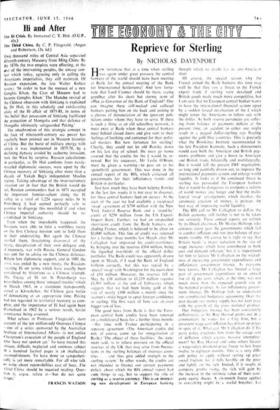Ili and After
Two thousand miles of Central Asia separated fifteenth-century Muscovy from Ming China. By the 1870s the two empires were effecting, at the (lost of the intervening peoples, the uneasy con- tact which today, agreeing only in calling the Americans imperialists, they still maintain. Of Russian expansion, the late Walter Kolarz srote: 'In order to ban the menace of a new Genghis Khan, the Czar of Moscow had to become Genghis Khan.' The Manchu revival of the Chinese obsession with Sinkiang is explained by Dr Hsii, in this scholarly and exhilarating study of. the Ili affair of 1871-81, in.terms of 'the belief that possession of Sinkiang facilitated the protection of Mongolia and that defence of Mongolia ultimately safeguarded Peking.'
The anachronism of this strategic concept in the face of nineteenth-century sea power has regularly been pointed out in Western histories of China. But the burst of military energy with shich it was implemented in 1877-78, by a declining dynasty eroded by seaborne intrusion, took the West by surprise. Russian calculations in particular, as Dr Hsii confirms from newly- revealed diplomatic sources, were upset by the Chinese recovery of Sinkiang after more than a decade of Yakub Beg's independent Muslim regime. Taking advantage of the insurrectionary situation (or in fear that the British would do so), Russian commanders had in 1871 occupied the important frontier-salient along the Ill valley to a total of 1,224 square miles. In St Petersburg it had seemed perfectly cafe to promise to disgorge this mouthful if and when Chinese imperial authority should be re- established in Sinkiang.
Even when the improbable happened, the Russians were able to- foist a worthless treaty on the first Chinese mission sent to hold them to their undertaking. But again the Chinese startled them, threatening disavowal of the treaty, decapitation of their own delegate and, if necessary, war with Russia. General Gordon sas sent for to advise on the Chinese defences, Britain lent diplomatic support, and in 1881 the crisis was ended by a new treaty, the Russians vacating Ili on terms which have usually been considered by historians as a Chinese triumph. The Treaty of Ili (or St Petersburg) was nevertheless among those 'unequal treaties' which in March 1963, in a statement transparently aimed at Khrushchev, the Chinese gave notice of denouncing at an appropriate time. Peking had not regarded its territorial recovery as com- plete, and the importance of Ili had again been dramatised in 1962 by a serious revolt, Soviet connivance being assumed.
What echoes in Professor Fitzgerald's short account of the ten million-odd Overseas Chinese —one of a series sponsored by the Australian Institute of International Affairs—is not unlike Chesterton's evocation of the people of England who 'have not spoken yet.' To have treated this unique, difficult, neglected and ominous subject in a hundred factual pages is an intellectual accomplishment. To have done so sympatheti- cally is yet more remarkable. For all who talk er write about reponsibilities east of Suez, The (bird China should be required reading. Ones.' lion- it, argue. refute it—'but do not quite forget: FRANCIS WATSON






























 Previous page
Previous page